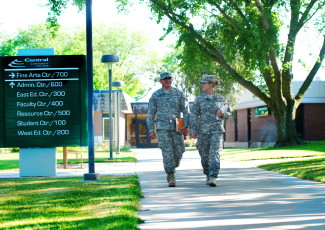A Look at What Community Colleges Do Well
By Corey Murray
December 4, 2014
Community colleges successfully address long-entrenched higher-education challenges.
If you work at a community college, you know firsthand the myriad ways your institution and others like it are helping students, businesses and communities thrive. As we continue the vital work of reforming our colleges for the challenges ahead, the national media is taking notice.
A recent CNN article mentions the work of AACC’s 21st-Century Initiative and highlights five ways that community colleges are helping students succeed in school and in the workforce, using five different community colleges or systems as examples. We’ve summarized three of them.
Reforming developmental education
It’s no secret that too many students enter college underprepared for the rigors of a college education. This has led to too many students playing academic catchup in the form of noncredit courses.
Committed to helping students enter college ready to take on meaningful for-credit work, community colleges have begun to rethink and revamp traditional developmental education. CNN shines a spotlight on the City University of New York (CUNY), where more than 6,400 students have benefited from a program called CUNY Start. Built for students who have high school diplomas or GEDs but need additional support to make the transition from high school to college, the program provides access to intensified study in three key subject areas: reading, writing and mathematics. Students can choose to focus on a specific area of need or take a special course that includes all three.
How successful is the program? Prior to CUNY Start, CNN reports that nearly 70 percent of the full-time students enrolled in the program failed pre-college assessments in the big three. After completing the program, 50 percent of those students demonstrated college-level proficiency in each of the three core academic disciplines, while an additional 31 percent demonstrated sufficient understanding in two.
Pivoting to meet local employer needs
In touting community college’s strengths in moving students directly from school to a job, the CNN article highlights Walla Walla Community College (WWCC) in Washington. The college offers renewable energy courses tied to the region’s growing wind-energy sector; started offering health care training when regional data showed a need for more nurses; and began a wine-making program, for which its graduates have helped grow the number of wineries in the state from 16 to more than 170.
WWCC partners with businesses to create these work-based programs, which help ensure that students are receiving useful training. Also, the college requires students to regularly meet with academic advisers, and retention specialists reach out to students at risk of dropping out; both measures help students remain on their educational pathways.
Building on existing skills through competency-based education
Competency-based education, which focuses on the applications of learning rather than on the amount of time spent in the classroom, is a burgeoning issue in higher education. This CNN piece addresses the issue from the standpoint of veterans who have left the military with skills that higher-education institutions often don’t count toward a degree. That’s not the case at Anne Arundel Community College in Maryland.
The college has created formal agreements with the military to match military training requirements with the college’s curriculum, has dedicated staff to evaluate how military training can be transferred into college credits, and offers a veteran-to-veteran mentoring program.
For more information on these examples and to read the two other ways community colleges are successfully taking on higher education reform, read 5 Ways Community Colleges Are Fixing Higher Education on CNN.com.
If you had a national reporter’s ear, what would you tell him or her about what your college is doing right? Tell us in the Comments.










